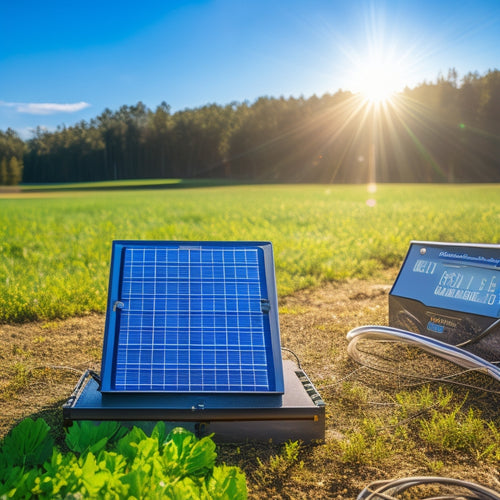
Residential Battery Backup Systems
Share
You're investing in a residential battery backup system to guarantee your home remains powered and comfortable during grid outages, while also reducing your reliance on the grid and wasteful energy habits. With a battery backup system, you'll have peace of mind during severe storms, as essential appliances like refrigerators and medical devices stay operational. By optimizing energy harvesting from solar panels, you'll minimize waste and enhance energy efficiency. Different battery chemistries, such as lead-acid or lithium-ion, impact performance, maintenance, and cycle life expectancy, so it's vital to choose the right one for your needs - and that's just the beginning of designing a reliable and efficient system.
The Essentials
- A residential battery backup system ensures continuous power during storms and outages, keeping essential appliances operational and maintaining comfort and well-being.
- The system optimizes energy harvesting from solar panels, reduces waste, and enhances energy efficiency, contributing to sustainability and energy independence.
- Battery chemistry options, such as lead-acid or lithium-ion, impact performance, maintenance, and cycle life expectancy, making informed choices crucial for effectiveness.
- Inverter compatibility is essential for integrating solar panels, charge controllers, and batteries, and options include grid-tie, off-grid, or hybrid configurations.
- A well-designed system configuration prioritizes essential appliances, allows for scalability, and provides load management, ensuring uninterrupted power supply during outages.
Storms Happen, Be Prepared
You've invested in a residential battery backup system, but can you truly count on it when severe weather strikes?
With a reliable system, you'll have storm protection guaranteed, ensuring your home remains powered even when the grid goes down.
A reliable battery backup for home provides an all-encompassing solution to three common problems that often arise during these events, including keeping essential devices powered and protecting sensitive electronics from damaging power surges.
Storm Protection Guaranteed
One severe storm can leave your home without power for days, disrupting your daily routine and causing food spoilage, communication disruptions, and even safety risks.
With a residential battery backup system, you can guarantee storm protection, giving you peace of mind and storm resilience. This system enables you to take control of your energy needs, providing energy independence from the grid.
In addition, a battery backup system safeguards your family's comfort and well-being by keeping lights, internet, and communication devices powered on Renewable Energy Systems, providing reassurance and stability in times of uncertainty.
During a storm, your battery backup system kicks in, seamlessly shifting to backup power mode. This means your essential appliances, such as refrigerators and medical equipment, continue to function, keeping you and your family safe and comfortable.
You can rest assured that your home remains powered, even when the grid is down.
Power Through Outages
Severe weather events can strike at any moment, plunging your home into darkness and disrupting your daily routine.
With a residential battery backup system, you'll have the power to take control of your emergency readiness. When the grid goes down, your system kicks in, providing a seamless shift to backup power. This means you'll stay connected, entertained, and comfortable, even in the midst of a prolonged outage.
By utilizing solar power batteries, you can store excess energy generated by your solar panels during the day, guaranteeing a reliable source of power when you need it most. Your residential battery backup system is designed to provide reliable power restoration, so you can continue to live life on your terms.
Whether you're working from home, caring for a loved one, or simply want to maintain a sense of normalcy, backup power guarantees you can do so without interruption.
With advanced technology and efficient energy storage, you'll have the freedom to power through outages, no matter the duration.
Reduced Energy Waste
When you install a residential battery backup system, you'll benefit from efficient energy harvesting, which guarantees that the maximum amount of energy is captured from your solar panels or generators.
By integrating solar panel energy storage solutions, you can maximize renewable power and optimize your energy usage.
You'll also minimize grid losses, reducing the amount of energy wasted during transmission and distribution.
Efficient Energy Harvesting
Optimizing energy harvesting is essential to minimizing energy waste in residential battery backup systems. You can achieve this by integrating solar power into your system, allowing you to utilize free energy from the sun.
Solar integration enables you to generate electricity during the day, which can then be stored in your battery backup system for later use. This not only reduces your reliance on the grid but also minimizes energy waste.
To guarantee efficient energy harvesting, you need to monitor your energy usage and production in real-time. Energy monitoring systems provide you with significant understandings into your energy consumption patterns, helping you identify areas of inefficiency.
By analyzing this data, you can optimize your energy usage, reduce waste, and maximize your energy independence. With advanced energy monitoring capabilities, you can track your system's performance, detect potential issues, and make data-driven decisions to optimize your energy harvesting.
Minimized Grid Losses
A key benefit of residential battery backup systems is that they minimize grid losses, reducing the amount of energy wasted during transmission and distribution.
You'll experience increased energy efficiency as your system stores excess energy generated by your renewable sources, such as solar or wind power, and uses it when needed. This approach reduces reliance on the grid, moving you closer to grid independence.
When you generate your own energy, you're not dependent on the traditional grid, which means you're not subject to transmission and distribution losses.
With a residential battery backup system, you can store energy during off-peak hours and use it during peak hours, reducing the strain on the grid. This not only saves you money but also reduces the overall energy waste.
By minimizing grid losses, you're contributing to a more sustainable future and taking a significant step towards energy independence.
With a residential battery backup system, you're in control of your energy, and that's true freedom.
Deep Cycle Battery Design
You'll need to take into account two vital aspects of deep cycle battery design for your residential battery backup system: the battery chemistry options and cycle life expectancy.
The choice of battery chemistry, such as lead-acid, lithium-ion, or nickel-cadmium, affects the overall system performance, cost, and maintenance requirements. When selecting a battery chemistry, it's important to take into account the type of application, such as off-grid power systems, to guarantee the battery meets the specific needs.
Additionally, understanding the expected cycle life of your batteries is also significant, as it directly impacts the system's overall lifespan and return on investment.
Battery Chemistry Options
As the heart of a residential battery backup system, deep cycle batteries rely on specific chemistry options to guarantee reliable, long-duration power supply. You have several options to choose from, each with its pros and cons.
Traditional lead-acid batteries are a common choice, but you may want to weigh lead acid alternatives like lithium-ion or nickel-cadmium batteries. These alternatives offer improved performance, longer lifespan, and increased safety.
When evaluating battery chemistry options, you should prioritize battery safety. Look for batteries with built-in safety features, such as thermal runaway protection and overcharge protection. These features assure your battery system operates within a safe temperature range and prevents overheating.
Additionally, weigh batteries with a low self-discharge rate, which means they'll retain their charge even when not in use.
Ultimately, the choice of battery chemistry depends on your specific needs and preferences. By understanding the strengths and weaknesses of each option, you can make an informed decision and guarantee your residential battery backup system provides reliable power when you need it most.
Cycle Life Expectancy
Deep cycle battery design plays an essential role in determining the cycle life expectancy of your residential battery backup system. When you invest in a reliable battery system, you want to guarantee it lasts for years to come. The cycle life expectancy of your batteries refers to the number of charge and discharge cycles they can handle before their capacity starts to degrade.
Proper battery maintenance and performance optimization are vital to extending the lifespan of your batteries. Regular checks and maintenance can help identify potential issues early on, preventing damage to your system.
Here's a breakdown of the typical cycle life expectancy for different battery types:
| Battery Type | Cycle Life Expectancy | Depth of Discharge (DOD) |
|---|---|---|
| Lead-Acid | 200-500 cycles | 50% |
| Lithium-Ion | 3,000-5,000 cycles | 80% |
| Nickel-Cadmium | 1,000-2,000 cycles | 80% |
| Nickel-Metal Hydride | 500-1,000 cycles | 80% |
Check Inverter Compatibility First
When selecting a residential battery backup system, you need to guarantee the inverter is compatible with your specific setup.
The type of inverter you choose matters, as it affects the system's overall performance and functionality.
For instance, when designing an extensive home energy storage systems, it's essential to reflect on the inverter's role in integrating solar panels, charge controllers, and deep cycle batteries.
You'll need to contemplate system configuration options, such as grid-tie, off-grid, or hybrid, to secure seamless integration with your battery bank and other components.
Inverter Type Matters
Typically, homeowners overlook a crucial aspect of residential battery backup systems: inverter type. This oversight can lead to inefficient energy storage and usage. When selecting an inverter, you should consider two essential factors: inverter efficiency and inverter capacity.
| Inverter Type | Inverter Efficiency | Inverter Capacity |
|---|---|---|
| String Inverter | 95-98% | 3-5 kW |
| Microinverter | 95-98% | 250-300 W |
| Power Optimizer | 97-99% | 200-400 W |
| Hybrid Inverter | 92-96% | 3-10 kW |
Inverter efficiency refers to the percentage of energy converted from DC to AC power. A higher efficiency rating means less energy is wasted as heat. Inverter capacity, on the other hand, determines how much power your system can provide during an outage. By understanding the differences between inverter types, you can choose the best fit for your energy needs and guarantee a reliable backup system. When selecting an inverter, prioritize high efficiency and appropriate capacity to maximize your energy independence.
System Configuration Options
Flexibility is key in designing a residential battery backup system that meets your unique energy needs. When it comes to system configuration options, you have several choices to make certain your setup is customized to your requirements.
Check inverter compatibility first, as it's vital for a seamless integration. You can opt for a single inverter system or a multi-inverter configuration, depending on your power needs and available space.
System scalability is fundamental, allowing you to add or remove components as your energy demands change. This flexibility guarantees your system remains efficient and cost-effective in the long run.
Load management is another significant aspect to take into account. You can configure your system to prioritize specific loads, such as refrigeration or medical equipment, during an outage.
This feature assures that your essential appliances remain operational when you need them most. By carefully selecting your system configuration options, you'll enjoy uninterrupted power supply and peace of mind, even during extended grid outages.
Lithium-Ion Lasts Longer
When you're considering a residential battery backup system, you'll want to choose a lithium-ion battery that can withstand the demands of daily charging and discharging.
Lithium-ion batteries are a popular choice because they offer a longer cycle life, which is the number of times a battery can be charged and discharged before its capacity degrades.
With a longer cycle life, you can expect your battery to last longer and require less frequent replacements.
Longer Cycle Life
Operating under the constant pressure of repeated charge and discharge cycles, residential battery backup systems require a durable battery technology that can withstand the rigors of daily use.
You need a system that can handle the constant flow of energy in and out of the batteries without degrading over time. Lithium-ion batteries are designed to provide a longer cycle life, making them an ideal choice for residential battery backup systems.
With proper battery maintenance tips, such as monitoring temperature and state of charge, you can maximize the lifespan of your lithium-ion batteries.
Additionally, implementing optimized charging strategies, like avoiding extreme depth of discharge and reducing charge/discharge rates, can also help extend the cycle life of your batteries.
Frequently Asked Questions
Can Residential Battery Backup Systems Be Installed Outdoors?
You can install battery backup systems outdoors, but you'll need to guarantee they're designed for outdoor installation and equipped with weather protection, such as waterproof enclosures and UV-resistant materials, to withstand harsh environmental conditions.
Are Battery Backup Systems Compatible With All Electrical Panels?
Can you imagine a seamless energy flow? Not all electrical panels are created equal, and you'll find that system compatibility varies, often requiring panel modifications to guarantee a harmonious marriage between your backup system and existing infrastructure.
How Long Does It Take to Install a Battery Backup System?
When you're considering a battery backup system, you'll want to know the installation process takes around 1-3 days, depending on the complexity of the job, with the installation timeline varying from a few hours to several days, giving you freedom from power outages.
Can I Use My Generator With a Battery Backup System?
You can integrate your existing generator with a battery backup system, optimizing generator integration and battery efficiency; this hybrid setup allows you to capture power from both sources, ensuring maximum energy independence and reliability.
Do Battery Backup Systems Require Regular Maintenance?
You'll want to guarantee your battery backup system's longevity by performing regular maintenance, which involves monitoring and updating software, cleaning connections, and checking electrolyte levels, to maximize battery lifespan and optimize maintenance frequency.
Final Thoughts
You've weighed the benefits of residential battery backup systems, and now it's time to take action. Don't let the initial investment hold you back - think of it as insurance against power outages and wasted energy. A high-quality system will pay for itself in the long run. Plus, with lithium-ion batteries lasting up to 10 years, you'll enjoy years of reliable backup power. So, go ahead and invest in a system that will keep your lights on, no matter what Mother Nature throws your way.
Related Posts
-

Building an Emergency Backup Solar Power System in 5 Essential Steps
Building an emergency backup solar power system involves five key steps. First, assess your daily energy needs to ide...
-

What Happens Without a Charge Controller in Solar Panels
Without a charge controller in your solar panel system, you risk overheating batteries due to overcharging, which can...
-

Choosing the Right Solar Power Charge Controller
Choosing the right solar power charge controller is crucial for maximizing energy efficiency and extending battery li...


